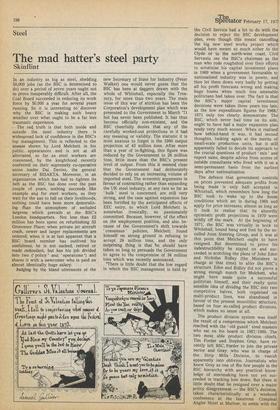Steel
The mad hatter's steel party
Skinflint
In an industry as big as steel, shedding 50,000 jobs (as the BSC is determined to do) over a period of seven years ought not to prove insuperably difficult. After all, the Coal Board succeeded in reducing its work force by 50,000 a year for several years running. So it is interesting to discover why the BSC is making such heavy weather over what ought to be a far less traumatic experience.
The sad truth is that both inside and outside the steel industry there is widespread lack of confidence in the BSC's top management. This is reflected in the unease shown by Lord Melchett in his public appearances and is not at all alleviated, so far as steel workers are• concerned, by the knighthood recently conferred on their supremely co-operative union leader Dai Davies, the general secretary of BISAKTA. Moreover, in an organisation which has had to tighten its belt as the BSC has done over the past couple of years, nothing succeeds like example and for steel workers, as they wait for the axe to fall on their livelihoods, nothing could have been more demoralising than the atmosphere of secluded largesse which prevails at the BSC's London headquarters. Not less than £2 million has been spent on refurbishing 33 Grosvenor Place; when private jet aircraft crash, newer and larger replacements are ordered; when it is at last apparent that a BSC board member has outlived his usefulness, he is not sacked, retired or made redundant, but has his job divided into two (' policy ' and ' operations ') and shares it with a newcomer who is paid an almost identically huge salary.
Judging by the bland utterances of the new Secretary of State for Industry (Peter Walker) one would never guess that the BSC has been at daggers drawn with the, whole of Whitehall, especially the Treasury, for more than two years. The main issue of this war of attrition has been the Corporation's development plan which was presented to the Government in March '71 but has never been published. It has thus become officially non-existent, and the BSC cheerfully denies that any of the carefully worked-out projections in it had any meaning or validity. The statistic it is most anxious to forget is the 1980 output projection of 43 million tons. After more than a year of in-fighting, this figure was reduced by the Government to 28 million tons, little more than the BSC's present level of output. From this it seemed clear that the Government had deliberately decided to rely on an increasing volume of imported steel. The economic arguments in favour of contracting rather than expanding the UK steel industry, at any rate so far as ' bulk ' steel is concerned, are still very strong, and the case against expansion has been fortified by the anticipated effects of EEC entry, to which Lord Melchett is, somewhat ironically, so passionately• committed. Because, however, of the effect on the employment position, and also because of the Government's shift towards ' consensus ' policies, Melchett found himself on strong ground in refusing to accept 28 million tons, and the only surprising thing is that 'he should have taken so long to persuade the Government to agree to the compromise of 34 million tons which was recently announced.
'There is little doubt that the low regard in which the BSC management is held by the Civil Service had a lot to do with the decision to reject the BSC development plan, even though this meant cancelling the big new steel works project which would have meant so much either to the Clyde or to the north-west coast. Civil Servants see the BSC's chairman as the man who rode roughshod over their efforts to scrutinise his capital investment plans in 1969 when a government favourable to nationalised industry was in power, and then let them down very badly by getting all his profit forecasts wrong and making huge losses when much less amenable politicians had taken over. The fact is that the BSC's major capital investment decisions were taken three years too late, as the low expenditure figures for 1968/ 1971 only •too clearly demonstrate. The BSC, which never had time on its side, ought to have had a major expansion plan ready very much sooner. When it realised how behind-hand it was, it had second thoughts, looking again at the merits of small-scale production units, but it still apparently failed to decide its approach to the crucial questions of product ' mix ' and export sales, despite advice from scores of outside consultants who lived with it on a semi-permanent basis from the earliest days after nationalisation.
The defence that government controls on prices prevented adequate profits from being made is only half accepted in Whitehall, which remembers how long the BSC took to wake up to the boom conditions which set in during 1968 and apply for price increases; almost as long as it took to realise that its absurdly optimistic profit projections in 1970 were wildly off the mark. At the beginning of 1971, the BSC was virtually in hock to Whitehall, bound hand and foot by the socalled Joint Steering Group, and it was at this point that Melchett ought to have resigned. But determined to prove his indestructibility he stayed on and succeeded in scotching the plans of John Eden and Nicholas Ridley (the Ministers in charge at that time) to altier the BSC's structure. Eden and Ridley did not prove a strong enough match for Melchett, who might have made quite a successful politician himself, and their really quite sensible idea of dividing the BSC into two competitive halves, both organised on multi-product lines, was abandoned in favour of the present monolithic structure, based on four so-called product divisions, which makes no sense at all.
The product division system was itself the result of a compromise which Melchett reached with the 'old guard' steel masters who sat on his board in 1967/1969. The two most able product division chiefs, Tim Forder and Stephen Gray, have recently left BSC, Forder to join the private sector and Gray, who was in charge of the Strip Mills Division, to vanish apparently into oblivion. Journalists who knew Gray as one of the few people in the BSC hierarchy with any practical knowledge of steelmaking have not yet succeeded in tracking him down. But there is little doubt that he resigned over a major policy disagreement — the BSC's decision, taken characteristically at a weekend conference at the luxurious Compleat Angler Hotel at Marlow, to settle with the Government over a much reduced investment programme and accelerated works closures. Those include the devastaion of Ebbw Vale. Ebbw Vale steel works, which had been promised only two years ago that it would be substantially reprieved, is now going to lose nearly two thirds of its jobs. Considering how well publicised the reprieve was at the time (it was personally announced by Lord Melchett on a special visit to the locality) there is an understandable feeling of betrayal at Ebbw Vale and the BSC has certainly not heard the last of it. The men of the BSC's River Don Works in Sheffield who stood out against an equally devastating and even less well-thought-out closure scheme last year have shown what determined resistance to BSC's closure plans can achieve.
Shotton, too, the BSC works in North Wales, which had reasonable hopes of becoming the basis of the big new steel works (now not going to happen) also feels badly let down after some of the assurances the workers there have been receiving over the years. The recent abrupt transfer to doomed Shotton of John Powell, the much-respected BSC manager responsible for Ebbw Vale, looks like a rather bizarre joke. His friends must be wondering if he, too, has a limited future in the BSC.
It is perhaps in its failures in dealing with human problems that the BSC hierarchy has been most culpable. The Corporation has a social policy unit, under a former Minister of Health, specifically concerned with the consequences of rationalisation and re-deployment, but it seems to have had little or no impact. It has a fortnightly industry journal, Steel News, but this is not allowed to publish anything controversial. (The slashing of the development plan was naturally described in Steel News as a magnificent step forward.) It has a very large industrial relations staff, but has not yet begun to solve the problem of white-collar unionisation in the industry.
As Lord Melchett is fond of claiming, • there is still a good deal of flexibility in the BSC's position. There is, perhaps, enough flexibility to accommodate doubts about the basic strategy of the develop ment programme which, even in its reduced form, will require thousands of millions of capital investment, and will commit our steel industry to the basic oxygen process which may well be either obsolete or uneconomic, at any rate when sited in this country, by the time the programme is completed. Have the costs of going on with the existing open hearth plants for a few more years been properly compared against the huge capital costs of the new programme? And what will be the return on this vast new investment, even without taking any account of all the disruptive social consequences of areas of Britain that are already very sad? The BSC presumably have some idea, and so does the Government, assuming they now believe the BSC's estimates. But the public is given no information on these crucial questions, and Government contributions to steel debates in the House of Commons continue to insult the intelligence of Members, especially those connected with steelmaking areas, who are not quite as illinformed as the Government and the BSC would like them to be.
Sadly, however, as the history of nuclear power and the Concorde episode only too clearly show, few politicians can resist the attractions of large capital investment schemes, provided, of course, they are sufficiently grandiose. That, perhaps, is the main reason why the BSC's development plan has been given the goahead. Even in its reduced form, it is going to run away with £3,000 million — and nothing as expensive as that can ever be a mistake.

































 Previous page
Previous page